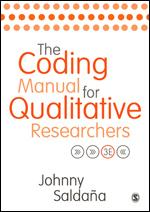The Coding Manual for Qualitative Researchers
The Coding Manual for Qualitative Researchers
Welcome to the companion website for The Coding Manual for Qualitative Research, third edition, by Johnny Saldaña. This website offers a wealth of additional resources to support students and lecturers including:
CAQDAS links giving guidance and links to a variety of qualitative data analysis software.
Code lists including data extracted from the author’s study, “Lifelong Learning Impact: Adult Perceptions of Their High School Speech and/or Theatre Participation” (McCammon, Saldaña, Hines, & Omasta, 2012), which you can download and make your own practice manipulations to the data.
Coding examples from SAGE journals providing actual examples of coding at work, giving you insight into coding procedures.
Three sample interview transcripts that allow you to test your coding skills.
Group exercises for small and large groups encourage you to get to grips with basic principles of coding, partner development, categorization and qualitative data analysis
Flashcard glossary of terms enables you to test your knowledge of the terminology commonly used in qualitative research and coding.
About the book
Johnny Saldaña’s unique and invaluable manual demystifies the qualitative coding process with a comprehensive assessment of different coding types, examples and exercises. The ideal reference for students, teachers, and practitioners of qualitative inquiry, it is essential reading across the social sciences and neatly guides you through the multiple approaches available for coding qualitative data.
Its wide array of strategies, from the more straightforward to the more complex, is skilfully explained and carefully exemplified, providing a complete toolkit of codes and skills that can be applied to any research project. For each code Saldaña provides information about the method's origin, gives a detailed description of the method, demonstrates its practical applications, and sets out a clearly illustrated example with analytic follow up.
This international bestseller is an extremely usable, robust manual and is a must-have resource for qualitative researchers at all levels.
Disclaimer
This website may contain links to both internal and external websites. All links included were active at the time the website was launched. SAGE does not operate these external websites and does not necessarily endorse the views expressed within them. SAGE cannot take responsibility for the changing content or nature of linked sites, as these sites are outside of our control and subject to change without our knowledge. If you do find an inactive link to an external website, please try to locate that website by using a search engine. SAGE will endeavour to update inactive or broken links when possible.

